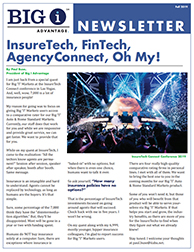SPECIAL FEATURE
Coming Soon: The Big I Advantage Newsletter
 The latest Big I Advantage® newsletter will arrive in Big "I" member mailboxes soon. The latest Big I Advantage® newsletter will arrive in Big "I" member mailboxes soon.
Preview the edition, which features updates and articles about all Big I Advantage® programs. The cover story is devoted to an important enhancement coming to Big "I" Markets soon. Other fresh content highlights new and important aspects of our insurance and non-insurance programs including cyber liability, flood, standard personal lines, commercial auto, and more.
To learn more about any of the programs the newsletter highlights, visit the Big "I" web site at www.independentagent.com and click on "Services" then "Products."
We welcome your feedback on this newsletter and any topics you would like to see covered! Email us with your suggestions.
|
Helping Banks Help Themselves
 One increasing claim trend seen at Travelers among financial institutions is a form of social engineering referred to as fraudulent instructions. In a bank's case, fraudulent instruction occurs when an employee is tricked into transferring money from a customer's account to somewhere else because a fraudster steals the customer's identity and convinces the bank through emails or phone calls to move the funds. With the benefit of seeing multiple claim scenarios, Travelers would like to share some of the best practices that can be used to prevent fraudsters from making your bank a victim. One increasing claim trend seen at Travelers among financial institutions is a form of social engineering referred to as fraudulent instructions. In a bank's case, fraudulent instruction occurs when an employee is tricked into transferring money from a customer's account to somewhere else because a fraudster steals the customer's identity and convinces the bank through emails or phone calls to move the funds. With the benefit of seeing multiple claim scenarios, Travelers would like to share some of the best practices that can be used to prevent fraudsters from making your bank a victim.
-
Train your staff. The Number 1 way to prevent fraudulent instructions is to have a well-trained staff that follows procedures, verifies a customer's instructions by calling the customer at a pre-determined number, and questions things when they don't look right. Your staff should not only understand the procedures but also why they are important. Train your staff not to deviate from procedures by taking shortcuts.
-
Deliver good customer service, but make the customer prove who they are. Don't hand the customer answers. In a recorded call, a bank employee was trying very hard to give the member excellent customer service but did so at the expense of the real customer. To questions such as "Are you still at 123 Main Street?" and "Is your phone number still 555-5555?" the crook simply had to acknowledge that the information was correct. Staff should require the customer to authenticate their personally identifiable information rather than acknowledge what is on file.
-
Know your customer. If a bank employee thinks a wire request is unusual for a certain customer, they should be empowered to dig further. Travelers had one claim where an 80-year-old customer requested a $750,000 draw from his home equity line of credit to be wired to Australia. When asked what the transfer was for, the purported customer said he was buying a rock quarry. Unusual requests should spark increased due diligence.
-
Escalate suspicion. Train your people that if they get a call that sounds suspicious, they should share it with others on the team. Just because one customer service representative wouldn't complete a transaction doesn't mean another attempt won't be made. It is important to talk amongst yourselves. These fraudsters are diligent, so bank employees must be, too. A consistent pattern exists: Crooks don't stop at just one attempt. They will keep calling back until they either get caught or there is no more money.
-
If a customer says they can't be reached at the phone number on file, call it anyway.
-
Beware of urgency, poor grammar, the word "kindly," and sentences that don't make sense or use improper words.
When these steps are taken and a socially engineered fraudulent instruction attempt fails, celebrate that success. If an employee prevents a fraudulent transaction, spread the news. Share the emailed instructions, discuss what was suspicious about it and post examples of fraudulent instructions. This helps the front-line team remember that attempts at fraudulent transactions are real and are constant. Bank employees must remain vigilant.
Travelers SelectOne® for Community Banks, underwritten by Travelers Casualty and Surety Company of America, is endorsed by the Independent Community Bankers of America. To find your local community bank, visit ICBA's community bank locator at www.icba.org/about/find-a-community-bank. Simply type in your zip code and the app will show you all the community banks in your area. A specimen policy is located in "Product Resources" on www.bigimarkets.com.
Travelers is committed to managing and mitigating risks and exposures, and does so backed by financial stability and a dedicated team - from underwriters to claim professionals - whose mission is to insure and protect a company's assets.
|
|
VU Webinars and Lightning Learning
Virtual University
|
WEBINARS - Two-hours with CE in select states.
View the complete calendar, registration links and see what states have CE approval online. Registration includes live webinar, on-demand recording and a transcript.
|
|
|
Prizes will be to the first response with the correct answers and then four selected at random from all received by 6p.m. EDT on Wednesday. Win a $5 gift card (Starbucks, Dunkin' Donuts, Baskin Robbins, or Krispy Kreme).
Congratulations to this week's winners - Megan Yochum (OK), Janet Lackey (OH), Cynthis Kress (NV), Liz Perez (ME), & Nadine Dockstader (MI).
1. Who is your Big “I” Flood/Selective Territorial Manager? - ANSWER VARIES
2. Which Irish-American dancer once had his legs insured for over $50 million? - MICHAEL FLATLEY
3. In the "What is a Personal Umbrella Policy?" video above what are the three things listed right away that could make YOU the target of a lawsuit? -
-
Own a dog
-
Driving a car
-
Inviting Guests into your home
TIE BREAKER
TB - In the movie "Back to the Future", on this date (11/05) in 1985 Marty McFly traveled back to his home town of Hill Valley, CA. The town square is actually a set used in what other movie series first released a year earlier? - GREMLINS
|
BIG "I" MARKETS SALE OF THE WEEK
Congratulations to our agent inArizona on a Jewelry Insurance sale of $5,468 in premium!
|
|
|
|
|
|
 |